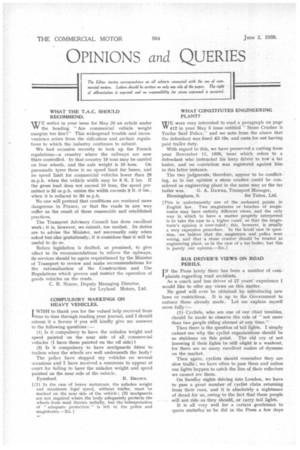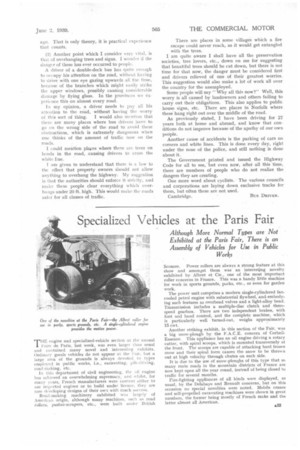OPINIONS and QUERIES The Editor invites correspondence on all subjects
Page 42

Page 43

If you've noticed an error in this article please click here to report it so we can fix it.
connected with the use of commercial motors. Letters should be written on only one side of the paper. The right of abbreviation is reserved and no responsibility for views expressed is accepted.
WHAT THE T.A.C. SHOULD RECOMMEND.
E notice in your issue for May 26 an article under VV the heading " Are commercial vehicle weight margins too fine?" This widespread trouble and inconvenience arises from the ridiculous and archaic regulations to which the industry continues to submit.
We had occasion recently to look up the French regulations—a country where the railways are now State controlled. In that country 19 tons may be carried on four wheels, and the axle weight is 10 tons. On pneumatic tyres there is no speed limit for buses, and no speed limit for commercial vehicles lower than 28 m.p.h. when the vehicle width may be 8 ft. 2 ins. If the gross load does not exceed 10 tons, the speed permitted is 35 m.p.h. unless the width exceeds 8 ft. 0 ins., when it is reduced to 30 m.p.h.
No one will pretend that conditions are rendered more dangerous in France, or that the roads in any way suffer as the result of these reasonable and established pra(thces.
The Transport Advisory Council has done excellent work; it is, however, we submit, too modest. Its duties are to advise the Minister, not necessarily only when asked but also gratuitously, if it considers that it will be useful to do so.
Before legislation is drafted, as promised, to give effect to its recommendations to relieve the railways, its services should be again requisitioned by the Minister of Transport to review and make recommendations for the rationalization of the Construction and Use Regulations which govern and restrict the operation of goods vehicles on the roads.
C. B. NIXON, Deputy Managing Director, for Leyland Motors, Ltd.
COMPULSORY MARKINGS ON HEAVY VEHICLES.
I WISH to thank you for the valued help received from Itime to time through reading your journal, and I should esteem it a favour if you will kindly give me answers to the following questions :—
(1) Is it compulsory to have the unladen weight and speed painted on the near side of all commercial vehicles I have them painted on the off side)?
(2) Is it compulsory to have mudguards fitted to trailers when the wheels are well underneath the body ?
The police have stopped my vehicles on several occasions and I have received a summons to appear at court for failing to have the unladen weight and speed painted on the near side of the vehicle.
Eynsford. R. 13aowN.
kJ) In the case of heavy motorcars, the unladen weight and maximum legal speed, without trailer, must be marked on the near side of the vehicle; (2) mudguards are not required where the body adequately protects the wheels from mud thrown radially, but the interpretation of " adequate protection " is left to the police and magistrates.—ED .1
WHAT CONSTITUTES ENGINEERING PLANT?
WE were very interested to read a paragraph on page " 412 in your May 5 issue entitled "Stone Crusher is Trailer Said Police," and we note from the above that the defendant was fined £5 10s. and costs for not having paid trailer duty.
With regard to this, we have preserved a cutting from your November 11, 1938, issue which refers to a defendant who instructed his lorry driver to tow a tar boiler, and no conviction was registered against 'him in this latter instance.
The two judgments, therefore, appear to be conflicting, as in our opinion a stone crusher could be considered as engineering plant in the same way as the tar boiler was. G. A. DAWES, Transport Manager, Birmingham, 6. for Tubes, Ltd.
[This is unfortunately one of the awkward points in English law. Two magistrates or benches of magistrates may have entirely different views, and the only way in which to have a matter properly interpreted is to take the case to a higher court, so that the magistrate's opinion is over-ruled: this, however, is usually a very expensive procedure. In the latest case in question, we believe that the magistrate and police were wrong, and that a stone crusher should be treated as engineering plant, as in the case of a tar boiler, but this is purely our opinion.—ED.1
BUS DRIVER'S VIEWS ON ROAD PERILS.
IN the Press lately there has been a number of complaints regarding road accidents. As a coach and bus driver of 27 years' experience I
would like to offer my views on this matter.
No good will ever be obtained by introducing new laws or restrictions. It is up to the Government to enforce those already made. Let me explain myself more fully :— (1) Cyclists, who are one of our chief troubles, should be made to observe the rule of "not more than two people riding abreast at any time."
Then there is the question of tail lights. I simply cannot see why the cyclist organizations should be so stubborn on this point. The old cry of not knowing if their lights be still alight is a washout, for there are so many excellent makes of dynamo on the market.
Then again, cyclists should remember they are slow traffic ; we have often to pass them and unless our lights happen to catch the line of their reflectors we cannot see them.
On Sunday nights driving into London, we have to pass a great number of cyclist clubs returning from their runs, and it is absolutely a nightmare of dread for us, owing to the fact that these people will not ride as they should, or carry tail lights.
It is all very well for a certain gentleman to quote statistics as he did in the Press a few days ago. That is only theory, it is practical experience that counts.
(2) Another point which I consider very vital, is that of overhanging trees and signs. I wonder if the danger of these has ever occurred to people.
A driver of a double-deck bus has quite enough to mcupy his attention on the road, without having to drive with one eye gazing upwards all the time, because of the branches which might easily strike the upper windows, possibly causing considerable damage by flying glass. In the provinces we experience this on almost every road.
In my opinion, a driver needs to pay all his attention to the road, without having the worry of this sort of thing. I would also mention that there are many places where bus drivers have to go on the wrong side of the road to avoid these obstructions, which is extremely dangerous when one thinks of the amount of traffic now on the roads.
I could mention plakes where there arc trees on bends in the road, causing drivers to cross the white line.
I am given to understand that there is a law to the effect that property owners should not allow anything to overhang the highway. My suggestion is that the authorities should enforce it strictly, and snake these people clear everything which overhangs under 20 ft. high. This would make the roads safer for all classes of traffic.
There are places in some villages which a fire escape could never reach, as it would get entangled with the trees.
I am quite aware I shall have all the preservation societies, tree lovers, etc., down on me for suggesting that beautiful trees should be cut down, but there is not time for that now, the danger must be considered first and drivers relieved of one of their greatest worries. This suggestion would also make a lot of work all over the country for the unemployed.
Some people will say "Why all this now?" Well, this worry is all caused by landowners and others failing to carry out their obligations. This also applies to public house signs, etc. There are places in Norfolk where these hang right out over the middle of the road.
As previously stated, I have been driving for 27 years both at home and abroad, and know that conditions do not improve because of the apathy of our own people.
Another cause of accidents is the parking of cars on corners and white lines. This is done every day, right under the nose of the police, and still nothing is done about it.
The Government printed and issued the Highway Code for all to see, but even now, after all this time, there are numbers of people who do not realize the dangers they are creating.
One more word about cyclists. The various councils and corporations are laying down exclusive tracks for them, but often these are not used.
Cambridge. Bus DRIVER.












































































